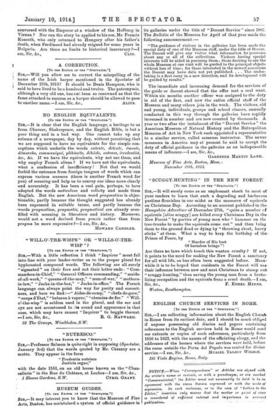NO ENGLISH EQUIVALENTS.
[TO rxe EDITOR or THE “Srecreros']
SIR,—It is clear that the English language, a heritage to us from Chaucer, Shakespeare, and the English Bible, is but a poor thing and in a bad way. One cannot take up any column of a newspaper, day by day, without perceiving that we are supposed to have no equivalents for the simple con- ceptions which underlie the words entente, detente, dmeute, demarche, communiqué, plebiscite, debticle, entrain, irredentist, Arc., etc. If we have the equivalents, why not use them, and why employ French aliens P If we have not the equivalents, what a confession of insufficiency ! Not that we would forbid the entrance from foreign tongues of words which can express various nuances (there is another French word for you) of meaning and help us to convey our ideas more clearly and accurately. It has been a real gain, perhaps, to have 'adopted the words meticulous and velleity and made them English. But the new American word pragmatism is objec- tionable, partly because the thought suggested has already been expressed in suitable terms, and partly because the .words pragmatism, pragmatic, pragmatical are already over- filled with meaning in literature and history. Moreover, would not a word derived from praxis rather than from pragma be more expressive P—I am, Sir, etc.,
HOWARD CANDLER.






































 Previous page
Previous page